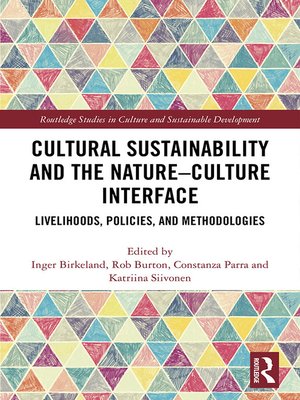Cultural Sustainability and the Nature-Culture Interface
ebook ∣ Livelihoods, Policies, and Methodologies · Routledge Studies in Culture and Sustainable Development
By Inger Birkeland

Sign up to save your library
With an OverDrive account, you can save your favorite libraries for at-a-glance information about availability. Find out more about OverDrive accounts.
Find this title in Libby, the library reading app by OverDrive.



Search for a digital library with this title
Title found at these libraries:
| Library Name | Distance |
|---|---|
| Loading... |
As contemporary socio-ecological challenges such as climate change and biodiversity preservation have become more important, the three pillars concept has increasingly been used in planning and policy circles as a framework for analysis and action. However, the issue of how culture influences sustainability is still an underexplored theme. Understanding how culture can act as a resource to promote sustainability, rather than a barrier, is the key to the development of cultural sustainability.
This book explores the interfaces between nature and culture through the perspective of cultural sustainability. A cultural perspective on environmental sustainability enables a renewal of sustainability discourse and practices across rural and urban landscapes, natural and cultural systems, stressing heterogeneity and complexity. The book focuses on the nature-culture interface conceptualised as a place where experiences, practices, policies, ideas and knowledge meet, are negotiated, discussed and resolved. Rather than looking for lost unities, or an imaginary view of harmonious relationships between humans and nature based in the past, it explores cases of interfaces that are context-sensitive and which consciously convey the problems of scale and time.
While calling attention to a cultural or 'culturalised' view of the sustainability debate, this book questions the radical nature-culture dualism dominating positive modern thinking as well as its underlying view of nature as pre-given and independent from human life.







